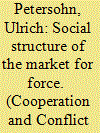| Srl | Item |
| 1 |
ID:
137236


|
|
|
|
|
| Summary/Abstract |
The operation of a vibrant illicit economy and government corruption are widely acknowledged as obstacles to the post-conflict reconstruction of Afghanistan. However, massive influxes of money tied to the international efforts have led to ‘legal’ corruption that similarly obstructs state consolidation and peace. This paper considers the various ways in which Afghan entrepreneurs have learned to ‘game the state’ by taking advantage of donor and especially US procurement systems since 2001. The conceptual framework and evidence suggests that designing ways to limit corruption arising from the state-building process is key to improving the long-run prospects for post-conflict reconstruction in Afghanistan and similar states where rapid and steep increases in foreign aid and associated contracts create fertile ground for malfeasance.
|
|
|
|
|
|
|
|
|
|
|
|
|
|
|
|
| 2 |
ID:
192748


|
|
|
|
|
| Summary/Abstract |
The existing literature on energy transitions mostly explains factors that affect whether a national government decides to make an energy transition to renewable energy. Less attention has been paid to how governments implement the policy to meet renewable energy targets and the challenges that arise after policy adoption. Specifically, the current literature misses the importance of contracting failures as one type of risk management that is important in local energy transitions. Therefore, we incorporate concepts from the contract risk management literature to explain local energy transitions. This article presents findings from an in-depth case study aimed at building theory about local energy transitions. It explains how Georgetown, Texas implemented its energy transition policy and the contract management challenges it experienced during implementation, which resulted in a significant electric fund shortfall. Our results extend the theory of local energy transition by incorporating contracting design and failures, processes to manage contracting risks, and feedback loops in the process of local renewable energy transitions. The results suggest that contract and risk management are integral components of the energy transition process. The article concludes with practical implications for local governments in managing financial risks in renewable energy contracts during energy transitions.
|
|
|
|
|
|
|
|
|
|
|
|
|
|
|
|
| 3 |
ID:
139842


|
|
|
|
|
| Summary/Abstract |
Over the past two decades, governments have increasingly contracted private military and security companies (PMSCs) to support military operations in conflicts. However, many observers have argued that such companies are ‘greedy market actors’ or ‘reckless mercenaries’ and their level of performance very poor. A minority has defended them as security professionals. If market competition is present, the level of performance is high and positive contributions to the client’s military operation can be expected. However, neither PMSC opponents nor proponents can account for the variance in the level of performance in three crucial cases – Sierra Leone, Iraq, and Afghanistan. This article argues that different market structures explain this variance. At least three ideal configurations exist: collaborative, competitive, and rival structures. These structures influence the level of performance. PMSC performance levels are expected to decrease from the first configuration, being positive, to the last, being negative.
|
|
|
|
|
|
|
|
|
|
|
|
|
|
|
|
| 4 |
ID:
144153


|
|
|
|
|
| Summary/Abstract |
The UK experience with defence inflation and cost escalation is described and analysed. Evidence is presented and policy solutions are reviewed. Optimism bias is a source of cost escalation and this bias is analysed with game theory and public choice models. The key facts remain, namely, that defence inflation exceeds the GDP deflator, and despite various reforms, cost escalation continues.
|
|
|
|
|
|
|
|
|
|
|
|
|
|
|
|
| 5 |
ID:
150647


|
|
|
|
|
| Summary/Abstract |
Municipalities aiming at mitigating climate change by implementing new energy efficiency technologies face budgetary and capacity constraints. Outsourcing through energy service contracting could provide a solution. This paper reports results from a survey of 1298 municipalities concerning barriers to retrofitting public street lighting and the possible role of energy service contracting to overcome these barriers. Using a logistic regression analysis, the authors investigate determinants of opting for energy service contracts in the specific context of LED retrofits. Results point to an advantage of outsourcing in a financially and capacity-constrained environment, which corresponds with the main reasons for engaging in contracting: minimising investments and financial risks. However, municipalities often do not fully grasp the risks associated with retrofitting especially using a novel technology such as LED. In relation to that they underestimate the risk reduction potential of energy performance contracts (EPC). Previous experience with outsourcing increases the probability to engage in servitization although certain existing partnerships, particularly with utilities, prevent municipalities from considering energy performance contracts. Interestingly, engaging an energy consultant has a negative propensity to use energy service contracts, while pre-negotiated standardised contracts for energy performance contracts have a positive influence.
|
|
|
|
|
|
|
|
|
|
|
|
|
|
|
|